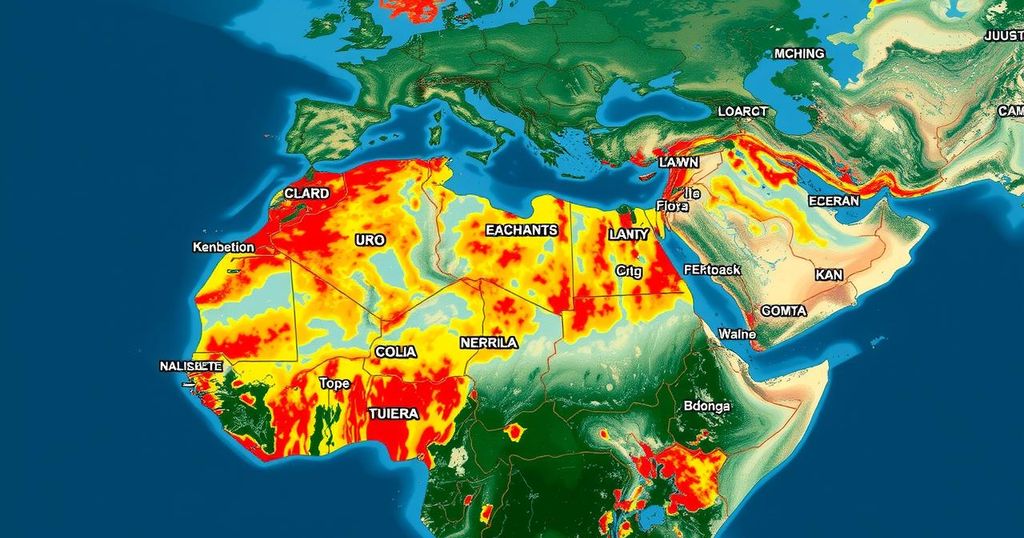Burkina Faso and Togo Enhance Flood Forecasting Through International Knowledge Exchange

Specialists from Burkina Faso and Togo participated in a knowledge-sharing mission to Sweden and Italy aimed at improving flood forecasting and early warning systems. They learned about the significance of operational protocols, local data integration, and robust legal frameworks for disaster management. The mission included visits to key institutions and concluded with actionable insights for enhancing national flood warning systems.
A delegation from Burkina Faso and Togo undertook an enlightening knowledge-sharing mission to Sweden and Italy, aimed at enhancing flood forecasting and early warning systems within their respective nations. The mission was initiated with participation from 19 specialists who aimed to assimilate operational strategies pertinent to disaster risk management and flood forecasts. The first leg of the delegation’s journey occurred in Norrkoping, Sweden, from October 16 to October 19, where they interacted with representatives from the Swedish Meteorological and Hydrological Institute (SMHI). The SMHI showcased its methodologies for producing and disseminating comprehensive meteorological and flood forecasts. Furthermore, the delegation visited Malmo, where municipal leaders elaborated on their resilience strategies that address flooding challenges. A critical observation made during the Malmo visit was the vital role of solid waste management in mitigating urban flooding incidents, as improperly managed waste significantly heightens the risk of canal overflow. The second phase transpired from October 20 to October 23 in Italy. In Rome, discussions with the Civil Protection agency focused on effective monitoring of hydrometeorological threats and emphasized operational communication processes among various stakeholders involved in flood forecasting. The delegation also traveled to Genoa to visit a local Civil Protection Center, where they learned about flood forecasting practices that highlight the integration of local data. Their tour concluded at CIMA Foundation in Savona, where participants delved into the necessity of employing science and technology to develop interoperable tools for enhanced monitoring and forecasting. The delegation surfaced a pivotal insight from Italy regarding the establishment of a coherent national legal framework for warning, preparedness, and response to flood risks. It is essential for this legal framework to outline explicit roles and responsibilities at national, regional, and local levels to ensure effective inter-institutional communication and coordination. This exchange of knowledge has energized institutions in Burkina Faso and Togo to refine their respective flood warning systems and fortify disaster risk reduction strategies. One of the ensuing actions from this interaction will be the formulation of standard operating procedures for national flood warning systems in both countries, applying the knowledge gleaned from their hosts. The mission was technically supported by prominent organizations such as the Swedish Meteorological and Hydrological Institute (SMHI), AGRHYMET, and CIMA, all of whom are dedicated to facilitating improved flood forecasting capabilities in Burkina Faso and Togo, under the auspices of the WMO’s Hydromet and CREWS Togo projects. Key national institutions participating in this collaborative effort included: – Burkina Faso: Agence Nationale de la Météorologie (ANAM), Direction Générale des Ressources en Eau (DGRE), Direction Générale de la Protection Civile (DGPC), Conseil National de Secours d’Urgence et de Réhabilitation (CONASUR), and Ministère de l’Administration Territoriale et de la Mobilité (MATM). – Togo: Agence Nationale de la Météorologie (ANAMET), Direction des Ressources en Eau (DRE), and Agence Nationale de la Protection Civile (ANPC).
Flood forecasting and early warning systems are critical components in disaster management, especially in regions susceptible to heavy rainfall and floods. Countries like Burkina Faso and Togo face significant challenges due to their geographical and climatic conditions, necessitating the establishment of effective protocols to manage flood risks. The collaboration with international experts from Sweden and Italy provides an opportunity for these nations to improve their flood management strategies through the integration of local data and best practices learned during the knowledge-sharing mission.
In conclusion, the knowledge-sharing mission to Sweden and Italy provided valuable insights into operational flood forecasting and disaster risk management for specialists from Burkina Faso and Togo. The learning experiences emphasized the importance of a robust legal framework, efficient inter-institutional communication, and the integration of local data in flood forecasting practices. Moving forward, the implementation of standard operating procedures in national flood warning systems will be essential in strengthening disaster preparedness and response capabilities in both countries. Continued support from international organizations will further enhance the effectiveness of these initiatives.
Original Source: www.miragenews.com






